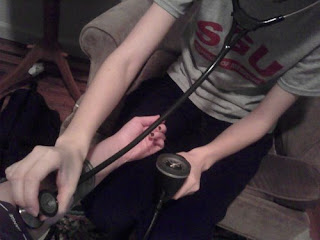Good Morning America covered this story on April 14th of this year, and played up the "tragedy" of the whole situation. It wasn't terrible coverage, but it wasn't too great, either. It didn't really scratch the surface, so was more exploitative than anything else, as far as I was concerned.
On July 10th I happened to catch this story for the first time on CNN. The Dorn story starts about 3/4 of the way down the transcript that is linked here. After going over the basic facts, the CNN anchor went to Dr. Wendy Walsh, a clinical psychologist who specializes in relationships for commentary. I must admit that I am usually biased against talking head TV psychologists. They either seem to a) say something that is so "common sense" that you just go "Duhh", b) try to wedge whatever topic it is into pushing some agenda of their own, or c) come up with some off the wall thing that they couldn't possibly infer from never ever meeting or talking with the principle people involved.
Dr. Walsh's comments both surprised and pleased me. She was both thoughtful and insightful. After the story focused (much like GMA) on whether Abbie could actually communicate or not thru blinking, Walsh immediately cut thru that to comment
And, you know, the question is, who cares if she can communicate or not? There's a living, breathing mother there...Who deserves to see her children. And the children, you know, Don, kids - everything is new and normal in the world of small children. I don't think that they'll be overly traumatized. Would people prefer that they're given a cold teddy bear to comfort them?
Walsh quickly followed with
And, you know, the biggest question this raises for me, Don, is what's going on in our culture that we institutionalize people with disabilities to the point that now we think it's just so wrong to even look at them or be exposed to them? What does it say that we're sweeping away the ugliness and not allowing families to have an integrated experience with people with disabilities? I think it's making us lose our compassion for people with disabilities.
Walsh also blogged on the story on her own blog here, where she also wrote
I’m concerned that the more we insulate people, young and old, from seeing the full range of human possibilities the more we limit our capacity for compassion.
My hat's off to Dr. Walsh. Rather than settle for a superficial recounting of a "tragedy", she cared enough to dig a bit deeper, and provide some thoughtful analysis. Like a good documentary film maker, she challenges us to think deeper not just about this particular situation, but about ourselves and the wider world.
Maybe I should pay more attention to TV psychologists. Or at least this one.













